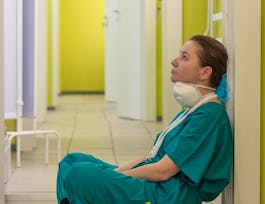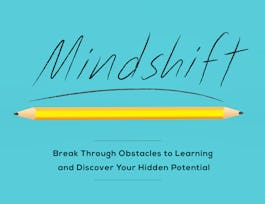The main goal of this class is to gain an introductory exposure to the nature of the psychiatric disorder known as schizophrenia as revealed by the scientific method. We will discuss a broad range of findings from the scientific investigation of biological and psychological factors related to schizophrenia and its treatment. More specifically we will learn about: (1) key symptomatic features through discussion and enactments of interviews with actors portraying many of the cardinal features of the illness, (2) what brain imaging studies (MRI and fMRI) and neurochemistry have taught us about the neuroscience of the disorder, (3) scientific psychological data and theories concerning cognition, emotion and behavior in schizophrenia, and (4) current, evidence-based somatic and psychosocial approaches to treatment. A brief historical overview of the recent emergence of the psychiatric category of schizophrenia will be presented as well.



(2,315 reviews)
Skills you'll gain
Details to know

Add to your LinkedIn profile
2 assignments
See how employees at top companies are mastering in-demand skills


Earn a career certificate
Add this credential to your LinkedIn profile, resume, or CV
Share it on social media and in your performance review

There are 5 modules in this course
The first module is focused on introducing key symptom characteristics of the psychiatric diagnosis known as schizophrenia, and describes current thinking around potential causes and biological correlates of the disorder.
What's included
6 videos
The second module is focused on a continuing exploration of symptoms in the disorder through simulated client-clinician interactions. Lectures in this unit also focus on the history of the treatment of schizophrenia in Western culture.
What's included
4 videos1 assignment2 discussion prompts
In the third module we begin to discuss the neurochemistry of the disorder as well as common manifestations of those diagnosed with schizophrenia on structural and functional brain MRI scans. First, though, we look at two more client-clinician simulations to explore symptoms and recovery.
What's included
5 videos2 discussion prompts
In the fourth module we discuss common cognitive deficits, disruptions in social cognition and cognitive models of the disorder.
What's included
8 videos
In the fifth module we discuss approaches to treatment with a focus on both pharmacologic and psychosocial approaches.
What's included
6 videos1 reading1 assignment
Instructor

Offered by
Why people choose Coursera for their career




Learner reviews
2,315 reviews
- 5 stars
80.20%
- 4 stars
17.20%
- 3 stars
1.76%
- 2 stars
0.60%
- 1 star
0.21%
Showing 3 of 2315
Reviewed on Oct 8, 2024
thank you for providing this course for free. I'm deeply grateful. it helped to develope more insights into this mental disorder. again, thank you very much for putting it out on Coursera.
Reviewed on Feb 8, 2021
Information and learning was far more than I expected. The lectures were clear, crisp and the information provided was relevant. I enjoyed the course and learnt quite a lot about the subject matter.
Reviewed on Apr 7, 2021
hank you for this course. I get know experience and knowledge in using different kinds of online tools which are useful and effective. I'll use some of them during my lessons. And lots of thanks.
Recommended if you're interested in Health

University of Toronto

Tecnológico de Monterrey

University of Geneva

Open new doors with Coursera Plus
Unlimited access to 10,000+ world-class courses, hands-on projects, and job-ready certificate programs - all included in your subscription
Advance your career with an online degree
Earn a degree from world-class universities - 100% online
Join over 3,400 global companies that choose Coursera for Business
Upskill your employees to excel in the digital economy


